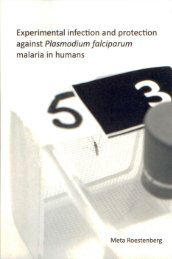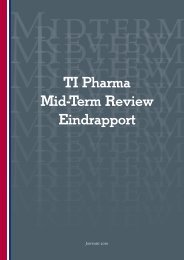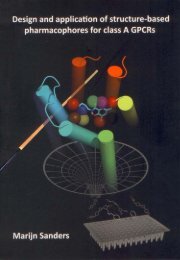2 - TI Pharma
2 - TI Pharma
2 - TI Pharma
You also want an ePaper? Increase the reach of your titles
YUMPU automatically turns print PDFs into web optimized ePapers that Google loves.
14. Russcher H, Smit P, van den Akker EL, van Rossum EF, Brinkmann AO, de jong FH, Lamberts SW,<br />
Koper jW. Two polymorphisms in the glucocorticoid receptor gene directly affect glucocorticoidregulated<br />
gene expression. j Clin Endocrinol Metab. 2005;90(10):5804-10.<br />
15. van Rossum EF, Roks PH, de jong FH, Brinkmann AO, Pols HA, Koper jW, Lamberts SW. Characterization<br />
of a promoter polymorphism in the glucocorticoid receptor gene and its relationship to three other<br />
polymorphisms. Clin Endocrinol (Oxf). 2004;61(5):573-81.<br />
16. van Rossum EF, Voorhoeve PG, te Velde Sj, Koper jW, Delemarre-van de Waal HA, Kemper HC,<br />
Lamberts SW. The ER22/23EK polymorphism in the glucocorticoid receptor gene is associated<br />
with a beneficial body composition and muscle strength in young adults. J Clin Endocrinol Metab.<br />
2004;89(8):4004-9.<br />
17. Syed AA, Irving jA, Redfern CP, Hall AG, Unwin NC, White M, Bhopal RS, Weaver jU. Association of<br />
glucocorticoid receptor polymorphism A3669G in exon 9beta with reduced central adiposity in<br />
women. Obesity (Silver Spring). 2006;14(5):759-64.<br />
18. Rosmond R, Chagnon YC, Holm G, Chagnon M, Perusse L, Lindell K, Carlsson B, Bouchard C,<br />
Bjorntorp P. A glucocorticoid receptor gene marker is associated with abdominal obesity, leptin, and<br />
dysregulation of the hypothalamic-pituitary-adrenal axis. Obes Res. 2000;8(3):211-8.<br />
19. Roussel R, Reis AF, Dubois-Laforgue D, Bellanne-Chantelot C, Timsit j, Velho G. The N363S<br />
polymorphism in the glucocorticoid receptor gene is associated with overweight in subjects with<br />
type 2 diabetes mellitus. Clin Endocrinol (Oxf). 2003;59(2):237-41.<br />
20. Davani B, Portwood N, Bryzgalova G, Reimer MK, Heiden T, Ostenson CG, Okret S, Ahren B, Efendic<br />
S, Khan A. Aged transgenic mice with increased glucocorticoid sensitivity in pancreatic beta-cells<br />
develop diabetes. Diabetes. 2004;53 Suppl 1:S51-9.<br />
21. Fritsche A, Madaus A, Renn W, Tschritter O, Teigeler A, Weisser M, Maerker E, Machicao F, Haring<br />
H, Stumvoll M. The prevalent Gly1057Asp polymorphism in the insulin receptor substrate-2 gene is<br />
not associated with impaired insulin secretion. j Clin Endocrinol Metab. 2001;86(10):4822-5.<br />
22. Ruige jB, Dekker jM, Nijpels G, Popp-Snijders C, Stehouwer CD, Kostense Pj, Bouter LM, Heine Rj.<br />
Hyperproinsulinaemia in impaired glucose tolerance is associated with a delayed insulin response<br />
to glucose. Diabetologia. 1999;42(2):177-80.<br />
23. Simonis-Bik AM, Eekhoff EM, Diamant M, Boomsma DI, Heine Rj, Dekker jM, Willemsen G, van<br />
Leeuwen M, de Geus Ej. The heritability of HbA1c and fasting blood glucose in different measurement<br />
settings. Twin Res Hum Genet. 2008;11(6):597-602.<br />
24. van Haeften TW, Dubbeldam S, Zonderland ML, Erkelens DW. Insulin secretion in normal glucosetolerant<br />
relatives of type 2 diabetic subjects. Assessments using hyperglycemic glucose clamps and<br />
oral glucose tolerance tests. Diabetes Care. 1998;21(2):278-82.<br />
25. van Haeften TW, Pimenta W, Mitrakou A, Korytkowski M, jenssen T, Yki-jarvinen H, Gerich jE.<br />
Disturbances in beta-cell function in impaired fasting glycemia. Diabetes. 2002;51 Suppl 1:S265-70.<br />
125<br />
6<br />
Chapter 6













